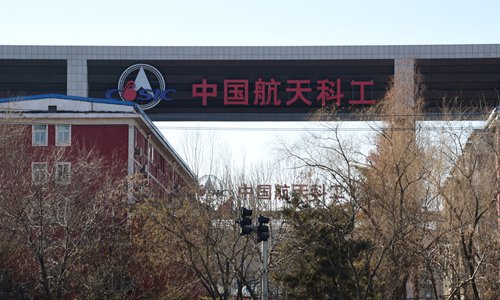
China Aerospace Science and Industry Corp headquarters in Beijing. (Photo: IC)
China's state-owned enterprises (SOEs) and private companies are racing to build up their capacity to produce more commercial satellites for their own ambitious networks, as the country's policy support for the industry attracts more capital.
Ground was broken on April 24 for a satellite industry park, where annual production is expected to exceed 100 satellites, in Wuhan, Central China's Hubei Province.
That park plans to build the first intelligent production line in China by 2020, according to a press release China Aerospace Science and Industry Corp Space Engineering Development Co sent to the Global Times.
The facility will produce satellites for the company's Hongyun project, which aims to construct a vast space-based communications network capable of covering the globe with broadband internet service. Under the project, the company launched its first satellite in December 2018.
Another production line operated by a satellite start-up, Spacety, based in Changsha, Central China's Hunan Province, began construction in January. It aims to reach annual production capacity of more than 100 satellites starting next year, according to local media reports.
SOEs and the private sector have accelerated efforts to expand capacity since the country gave policy support to the commercial satellite sector in 2015, according to analysts.
The National Development and Reform Commission and other departments jointly issued a support policy for civil space infrastructure development in October 2015, and the first batch of commercial space companies were established in the same year.
According to a report by the Xinhua News Agency in December 2018, in the first 10 months of the year, private companies launched five space missions. An increasing number of enterprises have moved into areas including rockets, satellites, telemetry and control.
Although the domestic market's value is estimated to reach 800 billion yuan by 2020, the profit model of the business is still not clear, Xinhua has reported.
According to a report published by Futureaerospace, an industry think tank, the number of private space companies in China reached 141 by the end of 2018.
The policy support will drive more capital into the commercial space sector, and a favorable business environment is taking shape, Huang Zhicheng, an expert in space technology, told the Global Times.
As more private capital is encouraged to join the market, fierce domestic competition will definitely drive technology upgrading and development in the space sector, said Huang. "However, total demand is limited, and only the fastest movers will survive."


